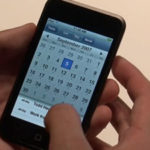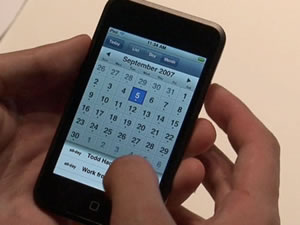
Abilene Christian University, among the leading users of mobile technology in higher education, will use a $1.8 million award from AT&T to build a studio for mobile learning experimentation and a K-12 professional development program that will train teachers to use education technology devices such as eReaders and internet-ready phones.
This isn’t the first time AT&T has partnered with ACU, a campus of almost 5,000 students in Abilene, Texas. The phone giant and Alcatel-Lucent helped develop the university’s Wi-Fi internet network earlier this decade. AT&T also gave $1 million to ACU in 2007 for the computer infrastructure in the school’s Bob and Shirley Hunter Welcome Center.
The wireless network powers the thousands of mobile devices—mostly Apple iPods and iPhones—that ACU has doled out to incoming students in recent years. The school pays for the mobile hardware, while students pay for the monthly AT&T service plan, according to ACU officials.
College students with internet-ready phones like the iPhone can check their tuition account balances, watch and listen to faculty lectures, take quizzes, answer surveys, and receive homework assignment alerts through their mobile device.
The university’s plans to launch a K-12 Professional Development Institute with part of the $1.8 million AT&T award has drawn interest from school systems representing more than 20 million students since its May 12 announcement, according to ACU.
The institute will bring mobile learning lessons to teachers in the U.S., Croatia, Australia, El Salvador, Canada, and the United Kingdom.
Phil Schubert, ACU’s executive vice president, said the mobile learning training will be aimed at students whose “limited access to information has kept [them] from maximizing instructional opportunities.”
He added: “Today’s widespread access to information provided by global data networks and converged mobile media devices means our students are engaged in the learning process.”
Award money also will be allocated for a learning studio on the top floor of ACU’s Brown Library, where students and faculty members will be able to use editing bays for creating video and audio clips, recording booths for capturing podcasts, and screening areas complete with high-definition recording equipment, according to the school’s announcement.
In addition, AT&T’s reward will be used to launch a mobile learning research program that examines the “effectiveness of mobile-learning initiatives and strategies” and to increase “the number of faculty members who conduct research in the expanding field,” creating best practices for K-12 schools and colleges, according to the school.
ACU began its Mobile Learning Initiative in 2008 when the school gave about 1,000 incoming freshmen the choice between an iPhone and an iPod Touch to be used for streaming educational videos and recorded lectures, among other uses. About 700 freshmen picked the iPhone, the university reported.
“It definitely has helped them feel more comfortable,” Bill Rankin, Abilene’s director of educational innovation, said in an interview with eCampus News last year. “It’s been a help for them.”
The school’s experimentation with mobile technology on campus continued in January when professors from the political science and journalism programs assembled 30 students to gauge reaction during President Obama’s first State of the Union speech.
The anonymous student responses encouraged nearly complete participation throughout the barrage of questions posed to students on their Apple devices, ACU officials said. As faculty who teach online classes have reported, student participation is consistently higher in a virtual environment than it is in pressure-packed face-to-face classrooms.
“It gave us an indication that a lot of students don’t want to get into the debate, but they want people to know how they feel about a certain subject,” said Dennis Marquardt, ACU’s education technology manager, adding that participation “exceeded” university officials’ expectations: “There’s definitely an element of conflict in there.”
ACU also made mobile-learning headlines in April when the university’s student newspaper, The Optimist, announced it would make its content readable on the Apple iPad, making it one of the first student papers available on the popular eReader. The university bought 20 iPads this spring for faculty members to research applications that can be used in the classroom.
Link:
- Research: Social media has negative impact on academic performance - April 2, 2020
- Number 1: Social media has negative impact on academic performance - December 31, 2014
- 6 reasons campus networks must change - September 30, 2014

